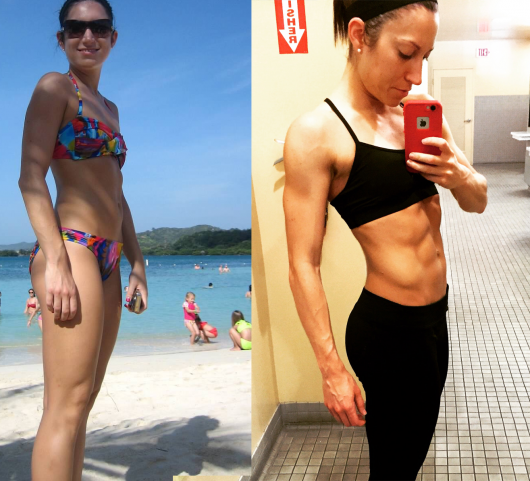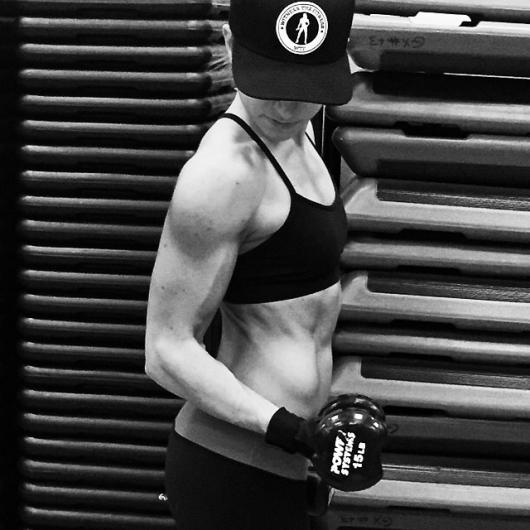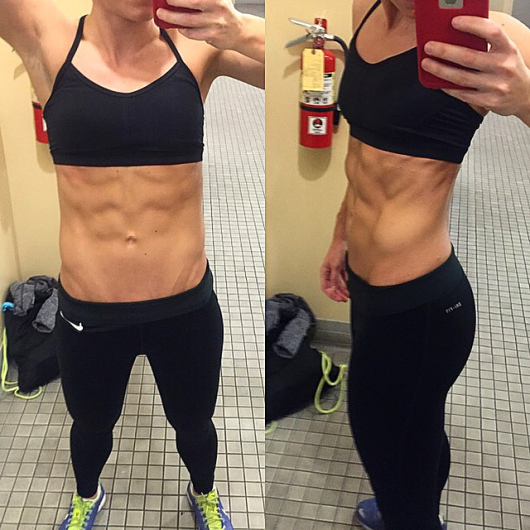I kept my eating disorder a secret for nearly 15 years. I did not tell anyone that I continued to struggle for so long because I was afraid of letting go of Ana.
Ana is a nickname utilized by many to describe their eating disorder, anorexia. For me, Ana represented my ideal skinny body image and my self-control with food.

I thought Ana was my key to happiness; however, when I dropped weight from 121 pounds to my goal weight of 112 pounds, I was anything but happy.
So, I decided to let go of Ana and turn to bodybuilding. Letting go was a process, which involved the following principles:
1) Focus on Lifting Weights, Skip the Cardio

Lifting weights increases muscle mass, which leads to a toned physical appearance. The bodybuilding community refers to this as physique, and it is the goal of training. Lifting weights has not made me look bulky, but has changed my overall body composition.
When I started bodybuilding, I was 121 pounds with 21% body fat; I now am around 118 pounds at 12% body fat. I fit differently in clothes, but am still the same size. People think I have lost weight and that I look smaller, but my body measurements are roughly the same.
Lifting weights consistently will build muscle mass, which increases the metabolism. By fueling my body correctly with the appropriate nutrition after weight training, I have gained muscle. With more muscle mass, I now burn more calories at rest, which promotes fat loss.
I do perform some cardiovascular exercise, but not a lot as it will break down the muscle mass I train so hard to acquire and build. Focusing on lifting weights has truly improved my body image.
2) Follow Nutritional Recommendations for Bodybuilders
To build muscle, I need to refuel my body a certain way. I need to consume enough calories because muscles cannot grow in a caloric deficit. Calories are made up of proteins, carbohydrates, and fats. I utilize MyFitnessPal which is one of the best fitness gadgets, to track my intake, to ensure that I am consuming the appropriate ratio of proteins, carbs, and fats. By doing this, it has helped change my relationship with food.
For the first time in my life, I do not feel bad about eating and actually look forward to it. Using a structured meal plan to achieve my physique goals is what has helped me stay in recovery.

3) Avoid Triggers
Most of my recovery has been based off of identifying my old behaviors, what triggers or initiates them, and developing new behavior patterns. Previously, when things in life became stressful, I would binge on cookies and cake, and then purge or vomit. It was my way of taking control of the situation and attempting to eliminate the stressor.
While I cannot eliminate all stress in my life, I can eliminate the binge. Thus, I continue to avoid consuming the foods I used to binge on. Maybe someday I can develop a healthy relationship with these food items, but for now, this is what I need to do to stay healthy.
4) Accept Imperfection
While I do focus on weight lifting, a certain diet, and avoiding triggers, I am not perfect.
There are times I do not follow my meal plan, and times when I do eat my trigger foods. I do still feel guilty when I eat my trigger foods, but I made a promise to myself that I will not purge.
Instead, when I feel the need to purge, I preoccupy myself by doing something I enjoy (e.g., favorite movie, go for a walk, or talk with a friend). I am able to hold myself to this promise because I do exercise daily. I know that my metabolism can bounce back pretty quickly and that I will survive without purging. The guilt is decreasing over time, and this is what is important to me. I accept that I am not perfect and neither is my recovery. It is not one size fits all.
5) Focus on My Happyness
To choose recovery, I had to let go of a lot of unhealthy relationships in my life, in order to put myself first. I realized that I needed to focus on what made me happy and healthy (lifting and eating healthy), and make that my number one priority. And in doing so, I have to continuously remind myself to not surrender my goals for the happiness of others.
This was a process that took about a year to put into practice, a process I will always value.
How did I make the change? I asked myself to do the following:
- Accept who I am
When I was developing my sense of self in my mid-20s I was surrounded by a group of people who were judgmental. Any time that I attempted to provide an opinion or stand up for myself, I was shot down and belittled. It took me 4 years to stand my ground and stand up for my beliefs, opinions, and character.
To this day, my mantra is as follows:
I have the permission to be exactly who I am; I have the right to feel what I feel and believe in the vision that I see; I never, ever have to deny my true self or pretend to be something I’m not; I am worthy of unconditional love and respect; I trust my heart; I take pride in my integrity; I believe in what is true to me and celebrate my authenticity; I live this life for me; I am uniquely beautiful.
- Know who I am
I grew up with a very flexible personality. Some had considered this a good quality, to be flexible and go with the flow. However, this was because I had identified myself by my eating disorder and my career in my early-mid 20s. It took me four years to develop who I am.
I had to ask myself the following questions:
What made me happy?
What did I value?
What did I believe in?
- Leave anything that does not serve me
I needed to leave certain relationships that drained me, and I needed to redefine my expectations of other relationships. A friendship or relationship with any person should be balanced and should be unconditional support. For a while I struggled with those in my life who only wanted to be around me if I was going to go out (drinking); however, this was not the healthiest for my recovery.
When I started realizing who in my life were unconditionally supportive, I chose to surround myself with those people most frequently. This made my circle of people quite small, and at times very lonely, but I know now it is what will help me stay in recovery.
To stay in recovery, I will always need to focus on these principles. They are what keep me happy and healthy.
Such stories like Katie’s and these women’s are amazing. They shows us that there is nothing impossible. If you want to change your habits, body or life, do it!



